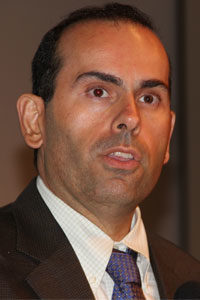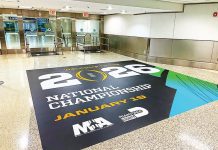
Dr. Omar Monteagudo could have been a captain of industry or a high-powered attorney. Such is often the trajectory of those who earn a Bachelor’s, Master’s, and Juris Doctorate degree. Fortunately for thousands of students, Dr. Monteagudo answered his calling to mold young lives and became a high school teacher for Miami-Dade County Public Schools in 1996.
After teaching Advanced Placement (AP) U.S. History, American Government and Macroeconomics for several years, Dr. Monteagudo assumed increasingly greater responsibilities until 2009, when he was named Principal of SAS, School for Advanced Studies and Academy for Advanced Academics (AAA). SAS is a nationally recognized collegiate high school in which high-performing 11th and 12th grade students complete high school while concurrently taking a full course load at one of five Miami-Dade College campuses. Students graduate with a high school diploma and an Associate in Arts degree from Miami-Dade College.
Under Dr. Monteagudo’s leadership, SAS has consistently received an “A” rating and Schools of Excellence designation from the Florida Department of Education. For the past four years, SAS has been ranked the top public high school in Miami-Dade County.
“Last year, 99 percent of our students earned an Associate in Arts degree from MDC and 55 percent went on to attend one of the top 50 colleges and universities in the United States,” says Dr. Monteagudo proudly. “Our students are well-represented at all of the major institutions in the nation including Harvard, Stanford and Duke. More than $43 million in academic scholarships has been awarded.”
Students from public, private, charter and parochial high schools, as well as home-schooled students, are eligible to apply. Applicants must pass an entrance exam administered by Miami-Dade College, have a minimum unweighted high school grade point average of 3.0 and meet other criteria. Because SAS is a public school, students receive free tuition and fees, free textbooks, and, if eligible, school bus and metro-rail transportation funded by Miami-Dade County Public Schools.
Launched during the 1988-89 school year, SAS today has more than 900 students enrolled, two thirds of whom come from homes that are considered economically disadvantaged.
“The beauty of SAS is that we’ve proven that academic excellence transcends a family’s zip code or socio-economic status. Here, achievement is geographically dispersed. Our students rise above their challenges and succeed despite all conceivable obstacles.”
According to Dr. Monteagudo, SAS students have the extraordinary drive, commitment and maturity required to excel in the program’s fast-paced, academically rigorous atmosphere. “It’s not just about being bright. Our students take a long-term view. They have aspirations and goals. The interesting thing is that this causes a type of ‘positive peer pressure’ that results in them pulling together. They create their own support network.”
A typical SAS senior’s course load is not for everyone: AP Calculus, AP Government, AP Microeconomics, AP Literature, a research class, plus a full college course load that range from 12-15 college credits per semester. There’s not much time left for a social calendar, let alone sleep. And that’s not all. SAS requires that all students participate in clubs and activities, including the National Honor Society.
One group of SAS students maintains a rarely-visited cemetery for African-American war veterans. “These kids aren’t doing it because it looks good on a college application, or to ingratiate themselves with others. They do it because it’s who they are,” says Dr. Monteagudo.
“Our goal is to create individuals who are multi-dimensional and well-balanced,” says Dr. Monteagudo. “We teach intangibles like the importance of compassion, humility and empathy. We also focus on social skills that are critically important for future leaders like looking a person in the eye, engaging in conversation instead of texting, and simple things like saying ‘please’ and ‘thank you.’ These things are just as important as reading, writing and math.”
A good metaphor for the kind of individual who graduates from the SAS program is a mango tree. A mango tree has roots and is grounded. It grows. And it gives back,” he says.
The School for Advanced Studies will host several information sessions in December and January for interested students and parents. For more information, please visit www.mdc.edu/main/sas or call (305) 237-0510.





